Do I love The Rings of Power? Go not to me for a final opinion, for I will answer both “definitely” and “not wholly.” We’re three episodes in now, out of eight for the season. Am I enjoying it? Absolutely. For general TV viewers or fans of fantasy, it’s a worthy show on its own merits. For Tolkien book-nerds, who know much more about the Middle-earth lore that the show can’t or won’t include, some contextual adjustment is necessary for proper enjoyment. It’s difficult but not impossible to do.
The Rings of Power is an adaptation of the compressed latter phase of the Second Age, based on the relatively sparse text about that period of time—as specifically referenced in The Lord of the Rings and its Appendices. It is very definitively not The Silmarillion, nor can it be, and reminding oneself of this fact is important. Casual fans of Tolkien or even just fans of the Peter Jackson films—who are largely unfamiliar with the legendarium beyond the famous trilogy—are probably enjoying it now. If they’re open-minded.
Here follows an opinion-riddled discussion of the show so far that’s also thick with spoilers. Be warned.
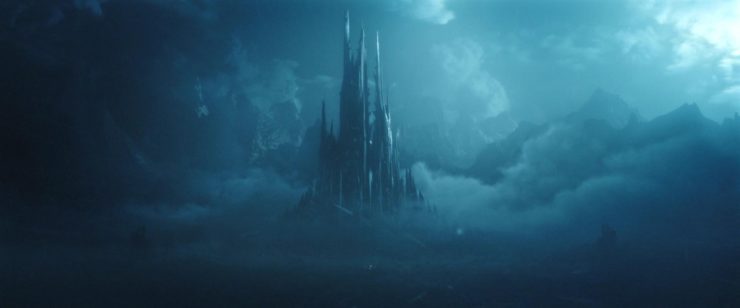
We lore-loving Tolkien book fans have to face an uncomfortable truth. The show isn’t really for us in particular, though its makers clearly hope we will enjoy it and speak well of it. The Rings of Power basically poses the question, “What if we never really had The Silmarillion and had to piece together the events of the Second Age based only on what was published prior to 1977?” I suppose it’s a little better than that. The showrunners have read the other stuff; they just can’t use most of it directly. Even so, the primary audience for The Rings of Power isn’t book fans. It’s everyone else. And that’s okay. When are adaptations ever just for those who already know the source material?
So for me, this means—at least for watching this show—that I have to let go of Finrod, the greatest Elf that ever walked The Silmarillion: first in Valinor, then in Middle-earth, then at last with “his father beneath the trees in Eldamar.” He was never mine, anyway. (#TeamFelagund over here.) But you know what? We’ve got his baby sister, and she’s pretty cool, too.
Anyway, I for one find The Rings of Power to be a spectacle, a feast for the imagination. It’s a big vision, even if it’s not exactly Tolkien’s and certainly smaller than his in scope. But even where it deviates from his work—concerning both the Lord of the Rings lore they do have rights to and the lore they don’t—it’s becoming a conversation piece for well-meaning viewers everywhere. Tolkien fans and non-Tolkien fans. Now, if someone makes those deviations (or perceived deviations, there is a difference) into sticking points, and then turns those points into hostile arguments, well, that’s something else. Who has time for that?
The entirety of J.R.R. Tolkien’s literary work is like the Anduin, the great river that flows southward through Rhovanion and across a significant length of Middle-earth until it reaches the sea at the Bay of Belfalas. It is fed by many sources—the linguistic and mythological mountains of Tolkien’s inspiration—and it flows down over the Falls of Rauros and beneath ruined bridges of Osgiliath. It is long and winding and unchanging. Every bit of music, every painting, every film or TV adaptation that is made by people other than Tolkien himself is either a pebble or a great boulder thrown into that river. It can be enjoyed in the moment by those who notice, creating a splash that some enjoy while others miss it completely. But the river flows relentlessly on.
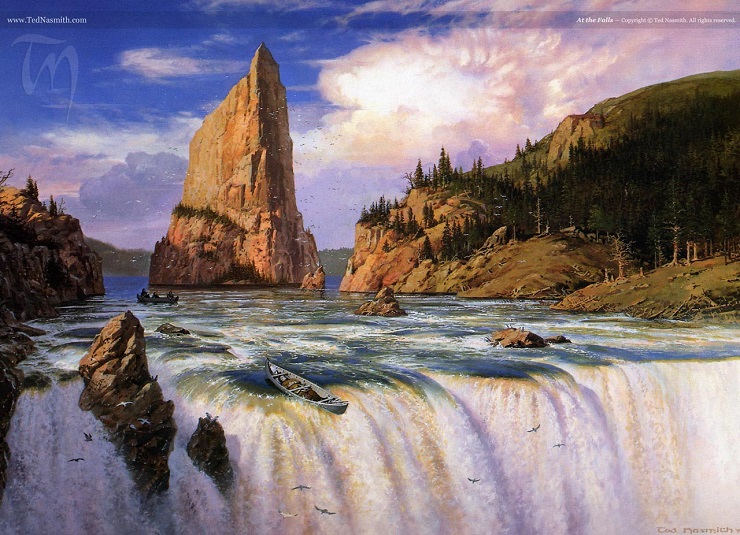
I suppose you could cry out, “Stop throwing rocks into the river at all!” and yell at those people who like to make art and adaptations, but the river doesn’t care. Or you could just not worry about it, and just enjoy the river. Or better still, hop into an Elf-boat and go along for the ride (i.e., just read the books and enjoy). But don’t worry about the pebbles and boulders, no matter how expensive they are or how much other people fuss over them.
Buy the Book
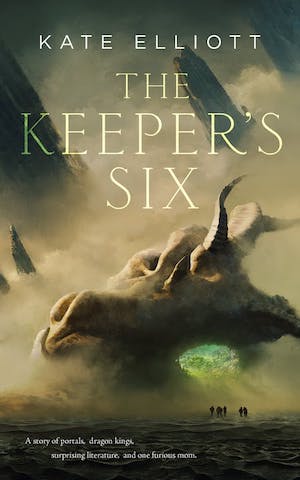

The Keeper’s Six
The Rings of Power TV show is one such boulder. It’s not worth getting upset over if you don’t like it. Just turn away from it. Disengage and turn the page. Even if it has an impact on popular culture that you don’t like, the river itself doesn’t care. It’s still there for you if you want it to be.
Now, let’s talk about the show in its own right. We now have three episodes of Season 1:
Episode 1, “The Shadow of the Past” — Galadriel persists in searching for Sauron despite centuries of his absence, fixating upon a particular sigil. Her old friend Elrond (who’s way younger than she is, honest) gives her advice. High King Gil-galad declares that Sauron is gone, thus all is triumphant and gives her a one-way ticket to Valinor. In the Southlands (future Mordor), descendants of Men who once fought for Morgoth are kept under watch by Silvan Elves like Arondir, but all is not well even though he totally likes the mortal woman, Bronwyn (and she likes him). Her son, Theo, has discovered a sketchy old sword-hilt stashed away beneath a barn that’s not ominous at all.
Gil-galad connects Elrond to Celebrimbor on LinkedIn. Proto-hobbits called Harfoots are a thing. Their leader, Sadoc, observes that “the skies are strange” just before a meteor hits the ground not far from their caravan. The young Harfoot Nori discovers that there is a man-like passenger in the crater. Galadriel and a group of Elves approach Valinor way out on the Sundering Seas, and she’s having major second thoughts. Elf overboard!
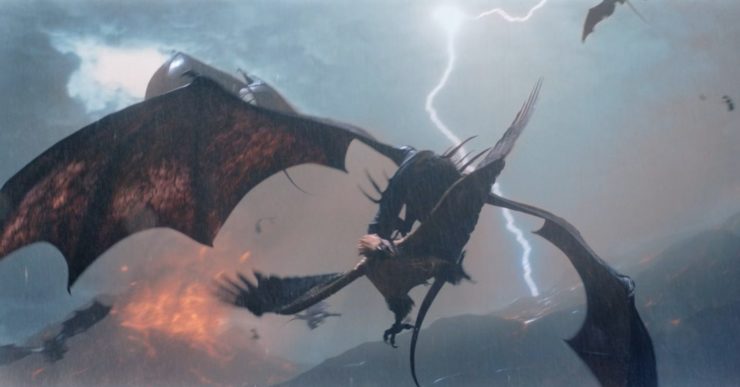
Episode 2, “Adrift” — Nori ignores her friend Poppy’s warnings of stranger danger. Arondir and Bronwyn discover that the nearest village (Hordern) has been torched, its people have gone missing, and that there are tunnels carved out beneath it. In Eregion, Celebrimbor tells Elrond that he wants to build a special forge tower for some tantalizingly vague project he’s cooking up. Elrond suggests they get Dwarves to help, and goes to check in with his old friend, Durin IV. Khazad-dûm is amazing, but his old friend is cranky. When Elrond realizes Durin is angry because it’s been twenty years since he’s visited, he’s apologetic, and he’s invited by Durin’s wife, Disa, to stay for dinner. Nori learns that the Stranger is trying to find something: a particular arrangement of stars, it seems.
Galadriel, now swimming far from land, chances upon some mortal men and woman likewise adrift. She and a man, Halbrand, are the only ones to survive the attack of a sea monster. Both Halbrand and Galadriel clearly have some issues. Arondir is captured by something, while Bronwyn returns to her own village to find an orc in her house. She and her son manage to kill it with considerable effort; bringing its head to the village elder as proof, she encourages her people to flee. Theo packs a bag for the road, including the totally evil sword-hilt.
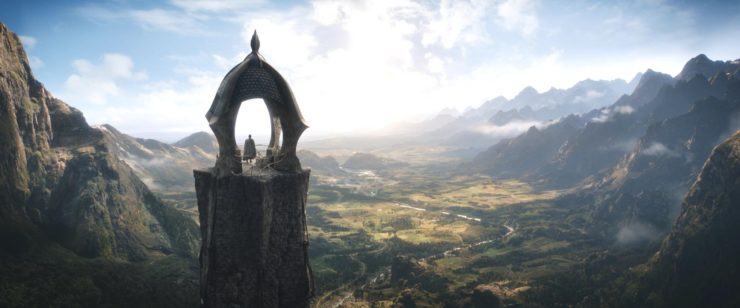
Episode 3, “Adar” — Arondir wakes up and finds that he and his Elf-buddies, and presumably the mortals from Hordern, have been captured by orcs. Orcs are back! (It’s been . . . centuries?) Galadriel wakes up and finds that she and Halbrand have been rescued by Númenóreans—specifically the captain Elendil. They’re brought into port, and marched right to a grand court without even an offer of footwear. They meet Queen Regent Míriel and Chancellor Pharazôn, who both seem contemptuous of Elves. Galadriel requests a ship to Middle-earth, but that’s a big ask and they want her to wait a few days. Halbrand shows a curious interest in smithing and a mysterious talent for combat, and soon lands himself behind bars.
Isildur and Eärien are the children of Elendil, and there’s some family drama among them. Elendil himself is sympathetic to Galadriel, and even takes her to a house of lore, where her friend Elrond is on an old tapestry! She finally has the revelation that the sigil of Sauron represents a place, and a plan, for some grand bad guy rendezvous. Arondir and the Elves try to escape enslavement, but it’s costly and it fails. At last a new villain shows up: Adar, a mysterious blurry Elf-like figure.
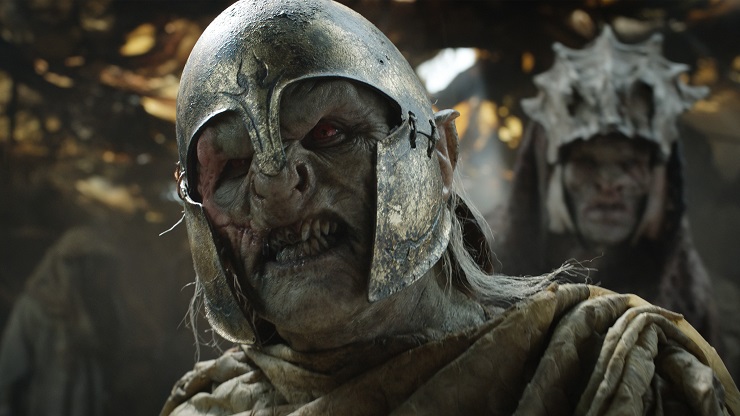
Five more episodes to go for this season. I am enjoying it immensely—even as the fussy book nerd in me opens up a mental notepad and runs a growing list of minor gripes. The stuff that’s fantastic, though? The music. The grand panoramas. The worldbuilding (or, I should say, world-reenacting). Even the acting and a significant portion of the writing and dialogue are excellent. I will not say: do not gripe, for not all critiques are an evil. But please, let’s critique with consideration, for it’s meant to be enjoyed by others, others who will not share our complaints. And that’s fine. We all get to disagree. Even without this show, the version of The Silmarillion in my head isn’t the same as anyone else’s. I assure you, Finrod is way cooler (in my head) than in yours, as he is surely cooler in yours than in mine.
Now, I must admit, the disregard or “change” to certain parts of Middle-earth lore is—to me—like an active character in the show. Like a major protagonist who is present in almost every scene. They’re not a terrible character at all, and sometimes they’re quite welcome, but they are there, all the time. I’m hyperaware of them, and it does prevent total immersion. Now, I absolutely realize some things must be different because the showrunners simply did not have the rights to the proper lore they’d otherwise be building from. But there are many things that are deviations from material they do have rights to, and those have a way of standing out even more.
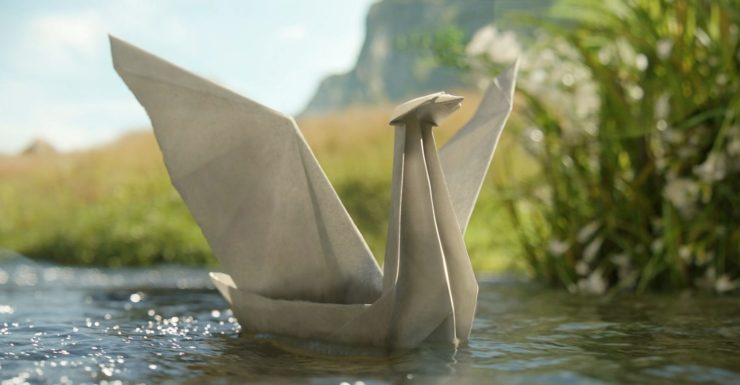
As I see it, there are two types of Tolkien lore that The Rings of Power is not getting “correct”:
- The lore they can’t use no matter what, so there’s no getting it right. Most of the writings Tolkien made about the Second Age falls into this category. There simply can be no Aegnor or Andreth, no Finwë, no Melian. No Gothmog, for crying out loud.
- Some lore that Amazon has rights to but they’ve chosen to change it. They have what’s in The Hobbit and The Lord of the Rings (in which the Appendices can be found). So for example, Míriel seems unfamiliar with the name Elendil even though Tar-Elendil is the fourth King of Númenor, and that’s right there near the start of Appendix A.
But to make this show work, they’ve also had to invent new lore, to fill in the conspicuous gaps they’re dancing around. And there’s nothing wrong in that, in concept, since the millennia that go by even in Tolkien’s conception of the Second Age are surely filled with people and events he never wrote about. Now, to the most casual of Tolkien fans or those only familiar with Peter Jackson’s film adaptations, this is, of course, all fine. It’s enough to make a good story. We must be very conscious of the fact that the millions of people who are Amazon’s target audience are not steeped in the source material; some may not be fantasy readers at all. They might not know Tolkien from Martin or Jordan from Le Guin. They just want to see an engaging story, and it’s easier for the showrunners to accomplish that by draping the show loosely around the recognizable works of Tolkien.
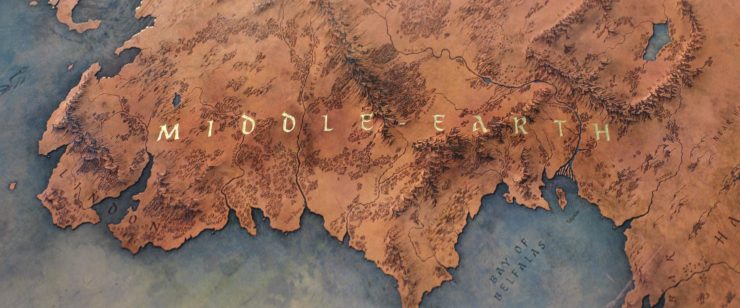
So this is merely an adaptation—emphasis on merely. On that point, I highly recommend that everyone check out the new YouTube series Rings & Realms, which is hosted by Dr. Corey Olsen and Dr. Maggie Parke, which they’re making specifically to analyze each episode. They’re not involved in the The Rings of Power show, but they care about lore and the methods of adaptation. Even if you only listen to Dr. Parke’s overview about the “tools of adaptations” and useful concepts for thoughtfully engaging with these works (around the 20-minute mark of the first episode), it’s worth it.
Now let’s talk about particulars!
Adar: All right, who is this jerk who commands orcs and seems to be a figure of reverence to them? An Elf? Perhaps one in service to the new Dark Lord, which would certainly break from Tolkien’s larger legendarium lore. Even the nastiest of Elves (Fëanor, Eol, etc.) never worshipped or served Morgoth directly (which isn’t the same as temporarily allying with him to betray his own people, as Maeglin did). Maybe Adar is Sauron, as one of the Elves wonders? Is he some sort of Orc forefather, an ancient Elf that helped beget their foul kind? If that’s the case, I’d want to know how he survived the First Age. I guess we’ll find out.
Arondir: I like him a whole lot. As an invented character, Payne and McKay could have done so much worse! I’d argue that Arondir is also the best depiction of Elves in this show so far. I’d love to know more about the Silvan community he comes from. Where does his supervisor, the Watchwarden, come from? The same place? Is he also a Silvan Elf? And they’ve made his romance with Bronwyn subtle and understated, and so it doesn’t bother me in the least (and I thought it would). It’s just sweet and tragic enough. Elves and mortals might have rarely been “paired” a few times in Middle-earth, but that doesn’t mean that unrequited love couldn’t have developed between them. The concept is hardly this show’s invention.
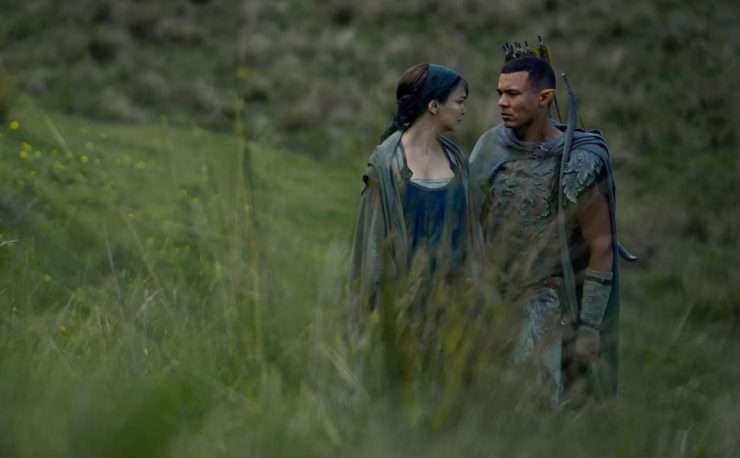
Bronwyn: I have almost nothing to say, because she’s just great. A cool mom, defensive of her people in various ways, and good with an orc’s own weapon, it turns out. She’s realistically terrified by the orc when she first meets him, but when her kid’s life is on the line, she pulls out all the stops.
Dialogue: For the most part it’s been all right. A few lines are gems. But there are clunky bits throughout that feel like a break in style from the rest, as if perhaps the writer of a particular episode just wasn’t very well-versed in Tolkien. Jackson’s films had these moments, too. I didn’t love Poppy referring to Men once as “humans,” and the mantra “The sea is always right” lacks the poetic power that Tolkien would have devised for the same concept in Númenor. Elendil’s exclamation of “Good gods” falls awkwardly in this world, not because the word “gods” doesn’t exist (the Valar were seen as gods by Men), but because it’s so typical in regular high fantasy and except for the plural, sounds like a modern utterance.
Disa: I just love her. She’s somehow great fun, but not over the top. Sophia Nomvete doesn’t deserve even a fraction of the social media scorn she’s received. Her character is the heart of the Dwarves in general and that dinner scene in particular. Disa is clearly both a clever mediator and a loving person. I can’t wait to go back to her, and see her at her day job! And hey, she’s got some whiskers, too. Are we settled on beards yet, internet? Probably not.
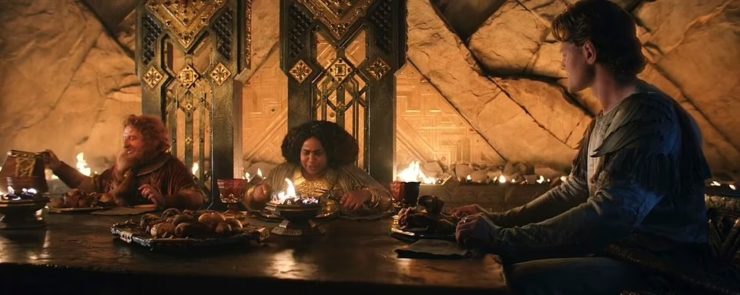
Durin IV: He’s fun. I’m only mildly grumpy that he coexists with Durin III, because stuff like that just doesn’t matter to the average viewer and I get it. I love the friendship they’ve established between him and Elrond. Once he opens up to his old Elf friend, I knew I’d care so much about what will become of him later. There’s no way he’s not going to end up with one of the Seven Rings. By the way, if you don’t watch with the subtitles on, consider doing so at least on a second go-round. It’s easier to pick up some of the quieter details. When he’s chasing his kids off to bed, Durin’s shouting at them, “It’s off to the salt mines, the both of ya! Cave-trolls and stalagmite spiders galore!”
Dwarves in General: Love ’em. The show is walking the perfect line between comedy and tragedy when it comes to the Children of Aulë, at least so far. The Khazad-dûm leitmotif is such an earworm, too, constantly vying for top billing against the Harfoot theme. I’m really hoping we’ll see a friendship start up between Celebrimbor and Narvi (will we ever meet Narvi?), and I can’t wait for Galadriel to interact with the Dwarves of Khazad-dûm as well. Knowing that she got along better with the Dwarves than her husband, and knowing that Gimli lies in her distant future, how can they leave that set-up out?
Elendil and His Kids: It takes some adjusting to see Elendil considered a mere Sea Guardsman who “was originally of a noble line.” And not the royal line? Book Elendil certainly held more of a claim to kingship than the likes of Pharazôn. I enjoy seeing him as a single dad (and now I want to know more about this wife, who Tolkien never named!), and I’m especially looking forward to the day when he tag-teams with Gil-galad while fighting on the slopes of Mount Doom.
His son Isildur seems to have humbler beginnings than Tolkien gave him. Who was whispering his name at sea? Are these just vague prophetic murmurings, or might that be the Maia Uinen herself distracting him while he’s training? In The Silmarillion and Unfinished Tales, Uinen is of reverential importance to the men of Númenor. Likely the show will never identify her out, but seeing statues of her around the city is at least a bit satisfying. Still, what would the Lady of the Seas know about Isildur’s doom? Then there’s Eärien, Isildur’s sister, another new character created for the show. We’ve only just met her, so what’s there to say? But it seems significant that she’s made apprentice in the Builder’s Guild, doesn’t it? I dig all the actors here. And though it was fast-paced, I rather enjoyed the scene where Elendil is sharing a meal with his son and daughter outside at night.
I now want to see a sitcom called something like Lords of Andúnië or maybe just Captain Dad. It’d be a spin-off show wherein Elendil doesn’t ever seem to know what’s going on with his kids, can’t relate to their generation, tries and fails to use young Númenórean slang, and people outside the family constantly mix up the names Anárion and Eärien. In each episode, the word “ring” turns up in different expressions, like “What you just said sure has the ring of truth, Isildur!” In one of the later episodes, Isil sneaks into the court of the King in the middle of the night and steals a fruit from the white tree Nimloth; the guards give chase. Hilarity ensues.
Elrond: I went in very dubious about this depiction of Elrond, who is such an important character. Something about the early stills—the stylish shorter hair, maybe, the too-youthful look, the Dawson’s Creek poster aesthetics—was rubbing me the wrong way. But Robert Aramayo has sold me on his character. This may be an alternate Elrond, but I like him nonetheless. I was expecting him to be smug or impetuous—some punk kid—but he isn’t. He’s mature and thoughtful, exhibiting the wisdom of the lore-master he’s meant to become. I appreciate his opinions and his retorts, and I am enjoying his chemistry with Galadriel, who is his elder. I don’t find it all that weird; he’ll one day marry her daughter, so, let’s keep things friendly and professional, all right? I think they will.
It wasn’t until the third episode that we get a hint of his lineage, and even that is a bit vague. That does bother me. Even if we don’t get to learn much about Ëarendil—his old man in the flying ship in outer space—I just need to hear it said who he is. This is Lord of the Rings lore, they can do this. I don’t think they’ve even stated that he’s half-elven, have they? What part of “Eärendil was my sire, who was born in Gondolin before its fall; and my mother was Elwing, daughter of Dior, son of Lúthien of Doriath” is so hard to say?

Elves in General: With some exceptions, I’m not overly fond of their depiction. What I want most is consistency. Now, I thought Peter Jackson’s Elves were too stiff and too Vulcan (Legolas and Galadriel, at least, felt sufficiently nonhuman), but Payne and McKay’s Elves swing too far the other way. They just look and feel like humans. I don’t like the sass, the attitude, or the snarky comments from some of them. Even the cruel Elf-children bullying Galadriel in Valinor felt off. I’m also not fond of the no-rhyme-or-reason haircuts. A case can be made that Elves can cut their hair, too—of course they can—but it kind of seems like there’s a hair salon in Lindon, maybe even in the Silvan Elf outpost. In the battle against the orcs and the warg, I legitimately could not tell if the others fighting with the main three—Arondir, Médhor, or Watchwarden Revion—were Elves or mortal men and women. I feel like we should be able to determine this.
Eregion: Beautiful, but it looks so . . . vacant. After that establishing shot of [presumably] the city of Ost-in-Edhil, we’re pulled right into Celebrimbor’s chambers without a glimpse of anyone else. Feels like a ghost town. And then when Celebrimbor and Elrond approach the western entrance of Khazad-dûm, it’s still just the two of them. Two very important Elves with no escort or guards. All right, so orcs aren’t a problem yet, but come now, they know trolls still exist, and surely mortal brigands crop up from the time to time. It felt like the show’s film crew couldn’t scoop together any extras on the day they shot that scene.
Finrod: I’m such a fan of the real book Finrod, so it’s very hard for me to like The Rings of Power take on him. Like, at all. He’s the only named brother of Galadriel’s in The Lord of the Rings, so I assume the writers have just rolled the other three brothers from The Silmarillion into the same character and turned him into a plot device. I do wish we’d had at least some mention of Beren, the mortal he died saving (that’s mentioned right there in totally-okay-to-use Appendix B), rather than running with the idea that he’d been killed “hunting” Sauron. The frat boy short hair . . . whatever, I guess. Not the same Finrod, in any case.
Galadriel: She sure is polarizing, isn’t she? I find the extreme opinions from viewers about Morfydd Clark’s portrayal to be astounding. Scroll through social media and you’ll see that she’s either the worst actress in the cinematic history of our galaxy and that she’s ruined people’s childhood fondness for The Lord of the Rings. . . or else she’s the 100% accurate version of Galadriel from the books, hands down, no question . . . with, what, a handful of people somewhere in between those two? I personally find Clark’s portrayal very compelling, even in those moments when she’s not the Galadriel we’ve seen in the past. I’ve read all the Galadriel stories; I’m a fan. In general, I’m here for Getting Stuff Done Galadriel With Kung-Fu Grip™. I don’t mind her battle prowess nor her military authority. At some point I would love to see her book-famous keen perception and her peerless wisdom finally upstage her skill in arms. But we’ve only just gotten started. They know what her arc will be. There’s no need to shy away from orc slaying, but I’d certainly prefer they tone down the sword-jumping before she goes full shield-surfing Legolas.
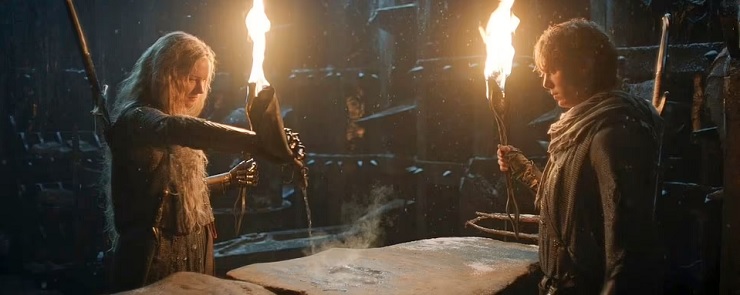
I see Galadriel’s development as a character, from the books, to be as follows. First Age: Impetuous, proud, ambitious, then tempered by the tutelage of Queen Melian in Doriath. Second Age: Wiser, cautious, magnetic, and organized. Third Age: Patient, guarded, watchful, powerful. The Rings of Power can’t address the First Age at all, so they’re starting her off as brash, steamrolling, and impetuous—as she might have been when first leaving Valinor. It works, either way.
Galadriel’s/Finrod’s Dagger: I mention this one on behalf of my musician and audio expert brother. When Galadriel slips the dagger from Finrod’s dead hand, and then later when the veiled attendant takes that same dagger from Galadriel’s hand on the boat, it makes that hilariously dramatic schwing sound that movies and TV shows just cannot stop using, as if they were drawn from metal sheaths. But why does a sheathed dagger make the same noise? Now it just cracks me up when I notice it, and I’m starting to imagine that same sound all over the place even when swords aren’t involved. Elendil scoops up an apple: Schwing!
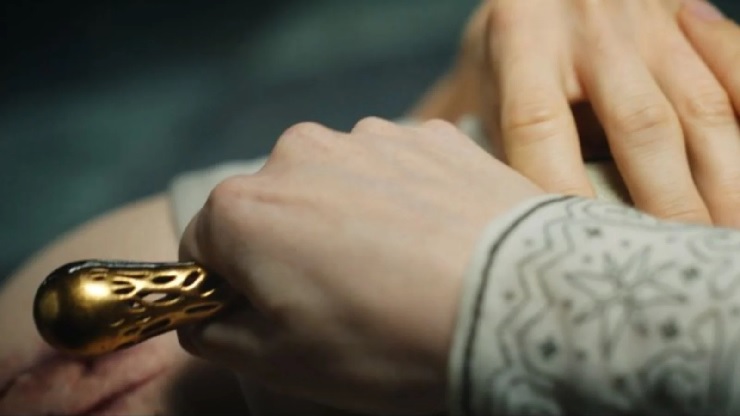
Gil-galad: Alas, he is my least favorite depiction of an existing Tolkien character. Expectations were high for him—well, he is the High King—from the moment Sam Gamgee sang his “Gil-galad was an Elven-king” song and through the realization that he is 50% of the team that brings Sauron down in single combat. The series’ version of him is weird. I didn’t like the implication that he doesn’t write his own speeches, that he uses archetypal twentieth-century politician body language, and that he isn’t the one who first detects “a new shadow” that he believes is “a servant of Morgoth.” They’ve given that to Galadriel (who, to be fair, did indeed have that role in one version of her character summarized in Unfinished Tales). It’s fine to tweak the lore, since it cannot all be used, but he is a figure who looms large in The Lord of the Rings. We just have to sit tight and see where the show takes him. It doesn’t help that he looks exceptionally human and has weird hair. *grumble grumble*
Halbrand: Nearly as mysterious as the Stranger, this one. But you know? I’m happy to have a few mysteries to mull over.
Harfoots: I liked them so much more than I thought I would, from the good-natured Tookishness of Nori (and Poppy) to the Shakespearean vignette Sadoc Burrows seems to present whenever he stands in the foreground with his two advisors, Vilma and Malva. The only thing I’m not so fond of is Nori’s full name (Elanor), since canonically, linguistically, and chronologically it feels like a misfire; Elanor being the name Sam Gamgee would give his eldest daughter because he loved the flower of the same name when he discovered it in Lórien. There also seems to be some confusion around the Harfoots’ “nobody goes off trail and nobody walks alone” mantra. The idea that as a vulnerable, nomadic, and little people, they’ve got to hold the safety of the community above the safety of an individual makes sense, but I don’t think we’re to understand that they just abandon the weak at every turn.
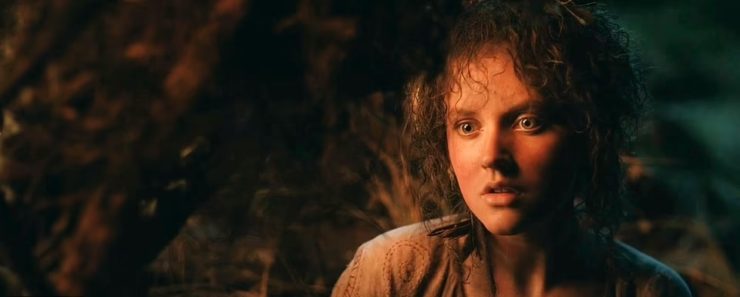
I’ve heard folks comparing various Harfoots to more famous Hobbits of the future. I’d rather we didn’t. Nori absolutely has some similarities to Frodo (taking on a dangerous responsibility, feeling like it’s her job to do so), and Poppy’s loyalty could be likened to Sam’s but at least she’s argumentative about it and resists in a way that Sam never would. If anything, the two Harfoot girls and their friendship feel more like an amalgam of all the more familiar Hobbits: Frodo, Sam, Pippin, Merry, and—why the hell not?—Fatty Bolger, too (he never gets enough credit). But mapping them one to one isn’t fair. Let’s let these characters do their own thing.
Khazad-dûm: Isn’t it amazing? The gardens, the waterfalls, the bridges; the place is bustling with industrious Dwarves. It was a strange juxtaposition to see such close-up life and activity right after the great emptiness of Eregion from afar. I’m hoping/assuming that some point, we’ll see that little door be removed and replaced with the proper West-gate of Moria, and get both Celebrimbor and Narvi on-site with whatever tools and scaffolding they need.
And, of course, keep the Stranger far away from the place.
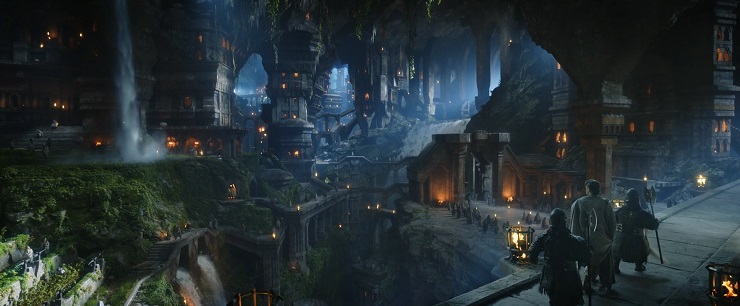
Men of the Southlands: The people of the Southlands (aka future Mordor) are all right, in my book. I’d love to learn more about their old Morgoth allegiance, and even to hear some mention of what regions they originally came from. Harad? Khand? Rhûn? Elsewhere in Eriador? Even the suggestion that these communities are the descendants of armies from disparate lands would justify the ethnic mix we’re seeing , which I rather enjoy even without knowing the backstory. It’s a reminder that all people can be deceived by the Enemy. And I appreciate the exploration of what it means to be descended from people who were aligned with the wrong side of history. It was compelling to see Arondir wedged between the resentful Men and the prejudiced Elves of his own group. It may have been generations since these mortals fought for Morgoth, but not so long to the Elves.
Men of Númenor: The scenery is incredible, the halls regal, the statues imposing without looking tyrannical. But I’m not quite sure the close-up view of its citizens matches this grandeur. The Rings of Power is showing us the tail-end of Númenor, so Elves are no longer well regarded. It does seem they’ve left out even some of the facts from Appendix A. Namely:
At first the Númenóreans had come to Middle-earth as teachers and friends of lesser Men afflicted by Sauron; but now their havens became fortresses, holding wide coastlands in subjugation.
That’s right, subjugation! Númenor goes from exalted sea-kings and saviors of the people of Middle-earth to imperialists. We’ve not seen enough, perhaps, but so far it feels like the island kingdom is simply dwelling in seclusion. They may turn away the boats of the Elves, but they haven’t yet talked about yoking the resources and the people of Middle-earth. This happens even without Sauron’s involvement, and it’s one of the major reasons for the deforestation of Eriador to which Elrond and Treebeard will one day allude. I suppose depending on how they wrangle the timeline, all the tyranny of Númenor might just be tied to Sauron’s involvement, in this version of the story. Which would undercut the obsession the Númenóreans are meant to have with their own mortality. But what’re ya gonna do? TV does TV.
Míriel: Cynthia Addai-Robinson’s performance exudes queenly presence, but we’ve yet to really get to know her. We’ve seen some of her diplomatic power, and what appears to be a good rapport with Pharazôn, but that may be some misdirection. I do wonder if her father the king(-in-exile) is still going to be Tar-Palantir. That might be awkward, given that the series’ version of Númenor is going to put to use at least one palantír (as we’ve seen in the trailers).
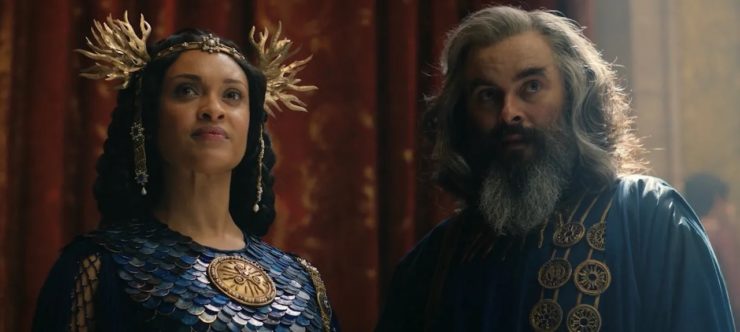
Music: Bear McCreary’s work is up to snuff. I went in suspecting the music would be a mere shadow of Howard Shore’s first six Middle-earth movie scores, and while I can’t yet say it’s on the same level (yes, with some Shore involvement—he wrote the main title theme, while McCreary scored the show itself), it’s gaining.
Orcs: I like them so far, but I don’t really understand them yet. Sunlight actually burns them as it does with vampires. I’m not crazy about that one of the orcs (at least in the cast list) is named Lurka. I do wonder if this show will try to delve further into the origin of orcs, which Tolkien famously had never finalized.
Peter Jackson Film Callbacks: The Stranger whispering to bugs. The Watchwarden stricken with arrows, all alone, like Boromir. An Elf saying, “What devilry is this?” I don’t love that they’re doing these things. I get why, but I think Payne and McKay are trying to have their cake and eat it, too. Deliberately inviting the comparison with the older films doesn’t help with immersion.
Pharazôn: Chancellor, eh? Not a cousin to Míriel, then, or least not likely. He’s charismatic, and it’s obvious the people of the queen regent’s court like him. He makes a joke, and they all laugh. Most likely he will simply manipulate his way into the crown, and not even need to marry to Míriel to seize power. Perhaps she will simply be “exiled” like her father. But who knows? Everything’s more than a little different in Rings of Power Númenor.
Sauron: Beyond his badass spear-holding intro, we haven’t knowingly seen the new Dark Lord yet. He’s described as Morgoth’s “most devoted servant,” and there he is in his classic black pointy armor. That might seem like a Jackson visual, but it’s really more of a John Howe visual (which in turn became a Jackson one), since it was a similar aesthetic used for Morgoth. No matter which way you slice is, this is Sauron basically cosplaying as his old boss.
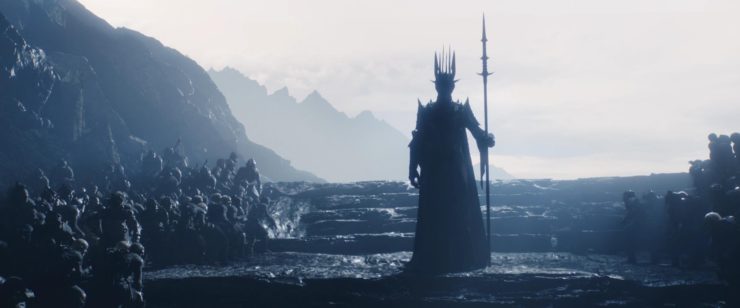
The Stranger: Too many theories abound. He’s so obviously being projected as Gandalf—and specifically as Jackson’s Gandalf, at that—so if that turns out to be the case, why are the showrunners being so coy about it? It’ll just be silly when we’ve all been right all along. But if it’s a long con, and he’s anyone else (especially a villain), they’ll need some truly impressive explanations to justify it. Bear McCreary’s music theme for the Stranger is wonderful and mysterious, but it’s not dark, not evil. It would feel wrong to give a true villain such a lovely theme unless his story is supposed to be tragic. No villain who survives to the end of the Third Age would be able to disregard Hobbits if they’d already met Harfoots in this way. Sauron and Treebeard both had no clue Hobbits were a thing until they encountered them. The Stranger’s repeating of the words úrë and mana might be a reference to the Sacred Fire? (“Blessed heat”), à la Gandalf. I’m trying to come around on the idea, to just accept it and enjoy.
And sure, he could be another of the wizards, but I have the feeling Amazon wants to rope in as many famous characters from The Lord of the Rings as it can for the wider audience. If it does turn out to be Gandalf, I really hope they don’t go Solo about it and try to explain every detail about him. Here’s why he ended up with a pointy hat; here‘s where he discovered the word “fool”; here’s the precise moment he first tried pipe-weed. Or worse, he’s the one who introduces it to the Hobbits-to-be.
Theo: More theories abound about Theo, and nearly everyone is guessing he’s got Nazgûlhood in his future, if not full-blown Witch-king of Angmar. But honestly, there’s little to go on, in terms of the story itself. That’s just us guessing at what the showrunners might do with him. I do want to know more about how he found that broken sword beneath the floorboards of the barn, rather than just showing when he’s going back to it from a previous, off-camera discovery of it. Clearly this is a relic from when his ancestors marched in Morgoth’s armies. Is this sword the “some sort of weapon?” that Arondir speculates the orcs are looking for?
Valinor / Sailing into the West: This is one of the hardest things to square with. Setting aside the awkward paradigm that High King Gil-galad must personally grant permission for Elves to return to Valinor (rather than the open-ended offer that all Elves enjoy in LotR and elsewhere) . . . or Galadriel’s jumping ship at the last moment . . . I struggle to understand why the approach to Valinor appears to be so ominous. It should be a mere voyage—true, a long one and maybe the approach itself would still feel like a wondrous event—and not a mysterious glowing portal in the Sea. There was such darkness and implied evil in the moment, it feels wrong for the Blessed Realm. Valinor is not Heaven, just an earthly paradise established by the Valar, but even so.
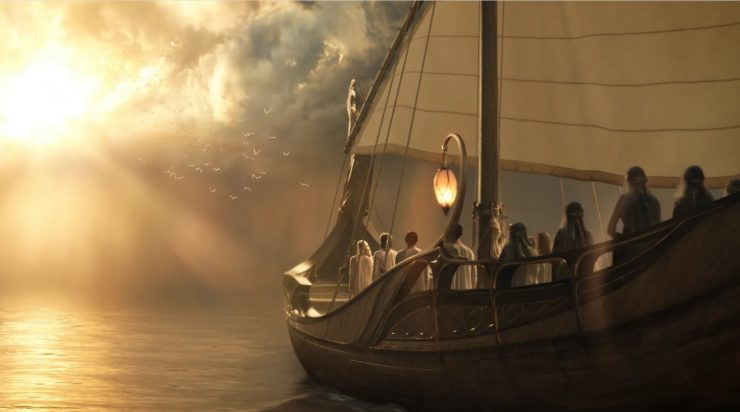
Visually, for non-book people, is it not still a bit confusing? We saw Valinor in Galadriel’s prologue, with the light of the Two Trees, then saw it darkened and left in apparent ruin. So why should returning there appear to be so filled with light again? It’s just puzzling. And say, who was sailing that ship? There are a lot of talented mariners among Elves. It looked like it was cruising along as if there were a motor in the back.
Warg: I’ve got no problem with the show’s googly-eyed warg. Mostly scary with a little dollop of goofy. I do wonder if that’s meant to be a typical warg, or a suped-up one, because it took down a few Elves.
***
Well, that’s it for now. This is obviously not intended to be a comprehensive list, just some running thoughts I wanted to share. Before I wrap this up, I’d love to know what other people think about the Easter Eggs. This show is full of them. But to be honest, I’m conflicted about them. As I see it, there are two varieties.
The first kind are Easter Eggs that are subtle but delightful bits of continuity with extraneous lore. Some seem to be subtle visual references to The Silmarillion, like those fearsome metal helms worn by the Dwarves of Nogrod and Belegost, but the truth is that such helms could absolutely still exist in Khazad-dûm as well. Why wouldn’t they? Other Easter Eggs are direct callbacks to passages in The Lord of the Rings. They’re even more justified. For example, remember when Théoden confessed to Pippin and Merry that he knew little about Hobbits? He goes on:
But there are no legends of their deeds, for it is said that they do little, and avoid the sight of men, being able to vanish in a twinkling; and they can change their voices to resemble the piping of birds.
When we are first introduced to the Harfoots, they’re effectively avoiding the sight of men (those hunters with the giant antlers). One even uses a whistle that resembles the piping of birds to signal to the others when it is safe to emerge again.
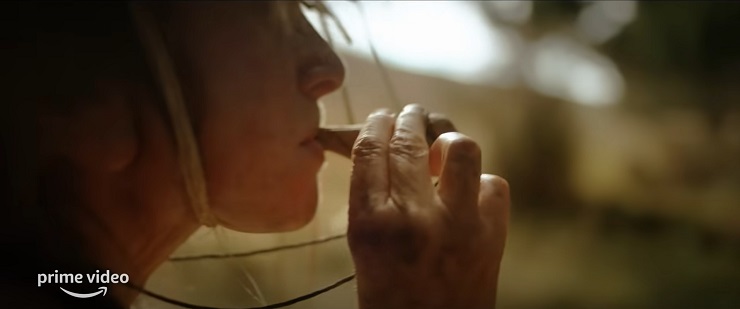
Then there are the other Easter Eggs that I’m not as crazy about. These are the nods to book materials the show doesn’t have the rights to. For example, the Elf-children throwing rocks at young Galadriel’s swan-boat seems to be an analogue to the theft and ultimate destruction of the swan-ships of the Teleri (Galadriel’s mother’s people). Then the dead Elves in blood-red water from Galadriel’s description of “the war” against Morgoth, which seems to be a visual reference to the Kinslaying at Alqualondë.
Cinematically, it looks amazing, but to me these things are frequent reminders of what Rings of Power can’t actually address in their story. So these are nudge-nudge-wink-wink moments, and I know a lot of Tolkien fans eat them up. And there’s nothing wrong with that. But I don’t know; they take me out of the moment, like a little fourth wall break. If you show me a carved wooden dog in one of the Elf memorials, then I’m reminded that they’re not allowed to actually use Huan, the Hound of Valinor. If challenged by a rights lawyer who wants to point out that they don’t have permission to include Huan, Amazon can say, “What? Who’s to say that particular Elf who died in the war didn’t have a dog?” These moments are like the showrunners giving a smile and a shrug in a ’90s sitcom intro sequence, an expression that seems to convey, That’s all we can do! I hope it’s enough for you!
I don’t want to sound like I’m just grumbling. I’ve really enjoyed the show. It’s far and away better than any other fantasy-related series that might be going on right now. And while I’ll fuss and quibble a little bit, I do intend to just enjoy the ride. It’s okay if you don’t appreciate the show or think it’s only just okay, or even meh. You can even hate it, but please try not to burn down anyone else’s appreciation.
I agree with what Clifford “Quickbeam” Broadway (of TheOneRing.net) wrote last month:
Ringers are good people indeed. I have learned via many interactions that Tolkien fans have a rather keen emotional wisdom. Let’s be honest, you don’t get through 1200 pages of LOTR and upon finishing “The Grey Havens” not feel deeply, terribly moved. Your heart hurts but you don’t know why at first. The mastery of Tolkien is right there: how he moves your very spirit is ephemeral, yet undeniable. Within this fandom people intrinsically understand that they are in good company. When strangers meet, Tolkien is an immediate touchstone of commonality.
Someone who is that emotionally invested in Tolkien’s work has no justification for attacking anyone else for their preferences and opinions. So please do opt out of any discourse if your desire is to be dismissive or shame others.
Jeff LaSala is responsible for The Silmarillion Primer, the more recent and much shorter Second Age Primer, the Deep Delvings series, and a few other assorted articles on this site. Tolkien nerdom aside, Jeff wrote a Scribe Award–nominated D&D novel, produced some cyberpunk stories, and works in production for Macmillan and the Tor Publishing Group. He is sometimes on Twitter.










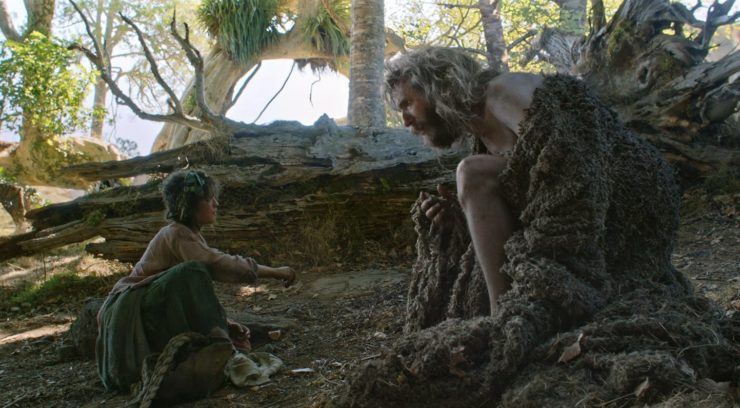
I feel that I’ve read somewhere that this version of Ar-Pharazôn is both chancellor and cousin. But I could be reading my book knowledge into it. As either, he could still marry her.
They could do that, sure. Since this Pharazôn already apparently has a nearly grown son, that feels . . . less likely now. They’ve already established that they can sideline a ruling king (Míriel’s father, who I hope is sitll Tar-Palantir), so the laws of RoPer Númenor already seem a bit more flexible. I can see Pharazôn simply being “voted” into power.
Since they’re going with the title of Chancellor, it sure will be hard not to read a bit of Palpatine in him!
Well, said, Jeff.
The most well-read scholars know that the lore on the legendarium was fluid and inconsistent, with multiple “alternate histories” already available.
Gil-galad was the nickname of Ereinion, the son of Fingon. Gil-galad was the nickname of Finellach, the son of Finrod. Gil-galad was the nickname of Rodnor, the son of Orodreth. And Orodreth was Finrod’s brother. And Orodreth was Finrod’s nephew.
(no need to explain, son, I’m from mountain folk myself…)
Amroth was Galadriel’s son. Amroth was the son of Malgalad. Amroth was the son of Amdir. Galadriel crossed the Grinding Ice with Fingolfin’s host and met Celeborn in Doriath (Celeborn was the great grandson of Elmo, brother of Elwe and Olwe). Galadriel sailed from Valinor with her lover Teleporno of the Teleri.
The Blue Wizards arrived in the Third Age and were called Alatar and Pallando. The Blue Wizards arrived in the Second Age and were called Morinehtar and Romestamo. The Sun was the last fruit of Laurelin, blessed, and carried in the sky in a hallowed vessel and steered by Arien, Maia of the Sun. The Moon was the last flower of Telperion, carried aloft and steered by Tilion, Maia of the Moon. The Sun was around since the very start and inhabited by Arien, who was ravished and murdered by Melkor. The Moon was created by Melkor to spy upon the world.
The World was flat and made Round at the Downfall of Numenor. The World was always Round. The Elves awoke in a world without Sun and Moon, about 350 “sun years” before being discovered by the Valar. The Elves awoke in the twilight before dawn, tens of thousands of “sun years” before being discovered by the Valar. There were 9.582 Sun Years in a Valian Year. There were 144 Sun Years in a Valian Year. Mahtan, Beleg, and Cirdan had beards. No Elf had a beard.
This is simply ANOTHER alternate narrative. And should stand or fall on its own two feet.
(By the way, my instinctive response to: “Perhaps one in service to the new Dark Lord, which would certainly break from Tolkien’s larger legendarium lore” would be (According to the Elf who wrote The Silmarillion, anyway. As with Elendil possibly putting a bit of a spin on the Akallabeth as to when the Numenoreans became imperialistic (compare with Tal-elmar), the author of the text in the Silmarillion (Pengolodh of Gondolin in the HoME texts) may well have put his own spin on things…
I’ll say, one thing that I hope they change up in future episodes is Galadriel’s initial characterization of the First Age and the Noldor’s mission in Middle Earth. As presented in the show, the role of the Valar is minimized and it sounds like the Noldor are sent as a “rescue force” for the poor mortals. Now, that’s Galadriel’s very emotionally invested summary, and the show absolutely has room to complicate the situation; but if they don’t, it leaves some unfortunate white savior/civilizing mission vibes floating around characters that we are supposed to consider “wise”.
As a side note, how is the Doom of Mandos covered in LOTR? IIRC it is at least namedropped, so they could (and probably should) use it, but I don’t remember how in-depth the reference gets.
The word Noldor itself doesn’t come up too much in LotR, and Mandos not at all. The Noldor are referred to as exiles a couple of times, but I don’t think it’s articulated much.
I completely missed that this Pharazôn had a son.
I did get the general “ick” factor from their interactions as played by the actors that I get from Ar-Pharazôn’s behavior in the story as laid out in Tolkien (i.e. that he wanted to marry her despite the age difference for Reasons of State, as well as a sense that Míriel might have a secret sympathy with the Elves.) My own prediction is that when her father actually dies we’ll see the marriage. But the son does complicate that, I guess.
I am not versed in the Deep Tolkien Lore. But it strikes me that Galadriel lacks diplomatic skills, even accounting for a compressed time scale. I can accept her not necessarily developing any while in Valinor, but is there no mention of her spending time in Thingol’s court? Surely that would have given her some familiarity with those skills, even if being one of Melian’s favored isn’t mentioned.
It seems like in this version of the story, Galadriel was never in Doriath. She’d have known about it, but yeah, I can’t imagine her having been mentored by a Maia for centuries. Not this Galadriel.
Unlike Faramir and Dain Ironfoot, I don’t really have a Second-Age dog in this race, so hopefully I can drift down the great river without too much toil. I am a Friend of Felagund though, so the warning is well taken.
I look forward to visiting with Eorl the Young and his crowd at some point! And I’ll be watching for a dwarven axe to go Schwing!
Given that Tar-Miriel explicitly points out that the name has more than one translation when Elendil, Captain of Numenor, very tactfully gives the least Elf-friendly translation of a name (and provides the alternate in question), I’d argue her query is more of a leading question than anything – intended to take the measure of this wellborn, but not particularly prominent officer in the Fleet of Westernesse, to be gauged by which translation of the name he offers.